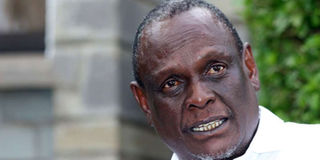My first encounter with David Murathe, Uhuru’s strategist

David Murathe during a press conference at his Garden Estate home in Nairobi on January 6, 2018, when he resigned from his position as Jubilee Party's former interim Vice-chairman. PHOTO | WILLIAM OERI | NATION MEDIA GROUP
What you need to know:
- Murathe, one of the ardent supporters of the KK alliance — which essentially birthed the ruling Jubilee Party — is now an avowed opponent of one of its leading lights, Ruto
- Of the cbout the clash between Ruto and Odinga, he once said that "without the Kalenjin, he (Mr Odinga) is done".
On a sunny Saturday afternoon of October 4, 2008, I received a call from a man whose mobile phone number I did not have.
He identified himself as Murathe, but I couldn’t recall the name and for a moment had him confused for Dr Stanley Murage, President Mwai Kibaki’s adviser and strategist.
INTRODUCTION
“Not Murage, Murathe,” the jovial, gravelly voice on the end of my mobile phone emphasised. I was still at sea. “David Murathe, the former MP for Gatanga,” he said. It mildly rang a bell. “I am now Uhuru’s (Uhuru Kenyatta) adviser,” he informed me by way of introduction.
I recall that call vividly even after all those years because it left a huge impression on me. At the time I was a rookie correspondent based in Nation Media Group’s Eldoret bureau and, therefore, not exposed enough to the country’s political movers to catch their attention or even that of their assistants. No one of Mr Murathe’s stature had called me before.
However, from that end of the world I had managed to write a number of in-depth analyses about the shifting political alliances that had obviously got the attention of some observers in certain quarters.
A tinge of fear often hits many a rookie journalists when they write articles that offend their powerful subjects. Mr Murathe’s unexpected call instilled that fear on me that day. What could he possibly want from a correspondent he had never met before? I braced myself for the usual harangue.
“I liked the article you wrote today,” he said. Well, that was some sort of relief. I can recall him saying to me: “That is very good work and I want to encourage you to continue that way.”
ALLIANCE
The article in question was a special report I had written about an attempt by MPs from the Kikuyu and the Kalenjin communities living in Rift Valley to form a political alliance as a way of ending the hostilities between them.
Members of the two communities living in Rift Valley clashed following the announcement of the results of the December 2007 presidential poll, which was won by President Kibaki (who was overwhelmingly supported by the Kikuyu), but disputed by his main challenger, Raila Odinga, whom the Kalenjin voted for almost to a man.
The proposed alliance was the brainchild of Molo MP Joseph Kiuna who termed it a reaction to what he claimed was the marginalisation of the Kikuyu diaspora by the regimes of presidents Jomo Kenyatta and Kibaki. Nominated MP Musa Sirma was among the first ones in the Kalenjin community to embrace the initiative.
“When two brothers fight, they often become best friends,” Mr Murathe told me that bright Saturday afternoon. “We should not have violence during every election cycle. This is the cure,” I can recall him telling me as clearly as my memory can serve me.
POWER-SHARING
The Kalenjin-Kikuyu union or popularly known as the “KK” alliance, was one of the many reasons for the fallout between Mr Odinga and one of his key lieutenants in 2007 campaigns, Eldoret North MP William Ruto.
Not only had Mr Ruto played a key part in Mr Odinga’s campaigns, he was in the four-man team that led the negotiations on behalf of Mr Odinga during the mediation talks led by former United Nations secretary-general Kofi Annan.
In the power-sharing agreement negotiated by Mr Annan, Mr Odinga was named Prime Minister deputised by Mr Kenyatta (representing President Kibaki’s side), and Mr Musalia Mudavadi representing Mr Odinga’s side.
Mr Ruto was named minister for Agriculture. But in a period of less than two years, the relationship between him and the PM had strained so badly over a number of issues culminating in Mr Odinga suspending Mr Ruto from the Cabinet in February 2010 over alleged graft.
CHANGES
All along, President Kibaki’s camp watched the infighting within ODM gleefully even as they sought to cut Mr Odinga down to size.
One note of memory that stuck with me all those years were Mr Murathe's remarks about the clash between Mr Ruto and Mr Odinga: “Without the Kalenjin, he (Mr Odinga) is done,” he said.
The main drivers of the KK alliance were to be Mr Kenyatta and Mr Ruto who were expected to mould it into a political vehicle through which to contest the 2013 presidential elections.
However, at the time of Mr Murathe’s call, Mr Kenyatta and Mr Ruto had not publicly warmed up to the idea of the ethnic alliance. The latter simply avoided any talk about it in public.
Mr Kenyatta said it would not work, accusing Kalenjin MPs of insincerity.
“Such an agreement cannot work because, while some of us are sincere, our brothers are not,” he said during Mr Kiuna’s homecoming ceremony in September 2009.
But in the end, they were forced to come together by circumstances beyond their control after they were both indicted by the International Criminal Court (ICC) for their alleged roles in the 2007/2008 post-election violence.
Well, 10 years later, things have gone full circle.
Mr Murathe, who was one of the ardent supporters of the KK alliance — which essentially birthed the ruling Jubilee Party — is now an avowed opponent of one of its leading lights, Mr Ruto, who is now Deputy President and is seeking to succeed President Kenyatta in 2022. How times change!





